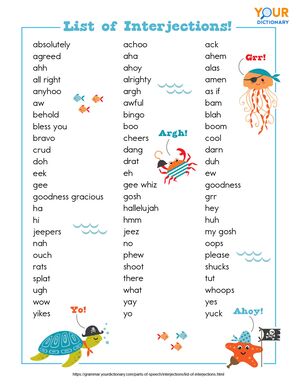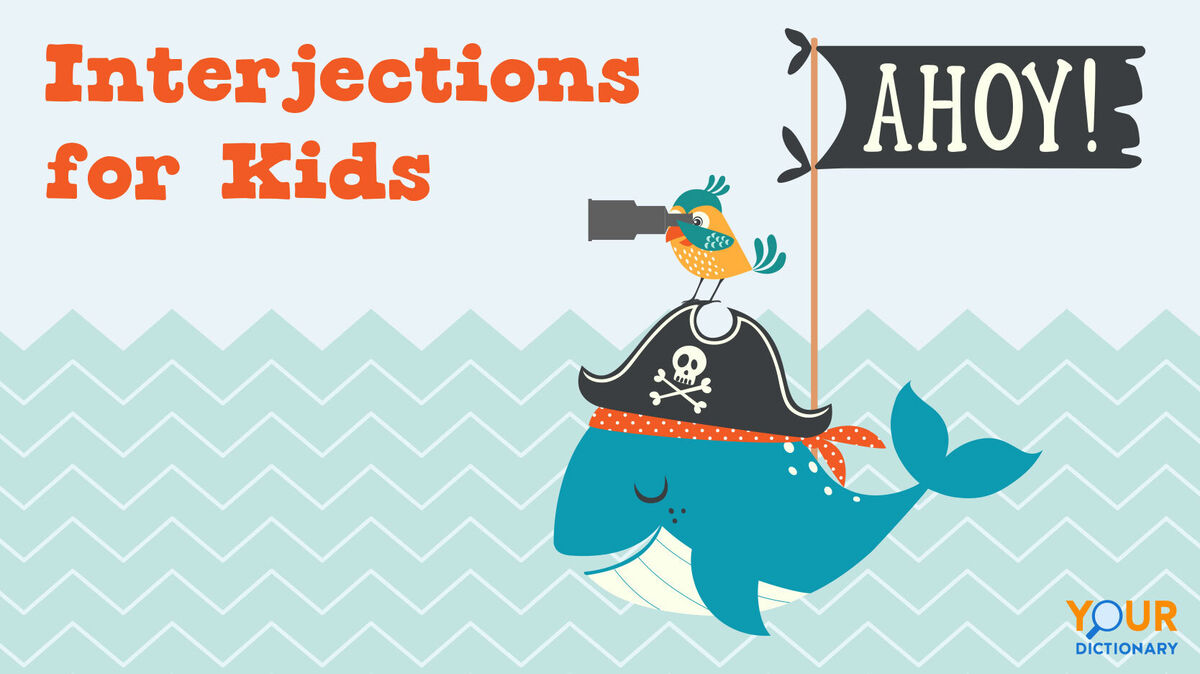

An interjection is an exclamation or sudden expression within a sentence. Common examples include ouch, well and wow! These little words can help you convey the proper emotion. Use a list of interjections for kids to add some expression in your writing.
List of Common English Interjections for Kids
If you want to jazz up your writing with some interjections, check out these words to get you started. Some are examples of onomatopoeia and add sound to your sentence, while others express agreement or disappointment.
absolutely - expressing certainty
aha - exclaiming a great finding or revelation
ahoy - greeting someone, particularly in a nautical context
awesome - showing that something is excellent
argh - a groan of disapproval
bam - a loud, startling sound
behold - drawing attention to something
bingo - indicating that something is correct
boom - a loud sound or bang
bravo - commending a good job
booyah - expressing excitement
cheers - wishing happiness
dang - expressing disappointment
doh - indicating that something has gone wrong (popularized by Homer Simpson)
eek - a frightened sound
fiddlesticks - expressing frustration
geez - expressing frustration or surprise
golly - expressing surprise or worry
hallelujah - a happy expression, literally meaning "God be praised"
hmm - thinking or pondering about something
huh - expression confusion or wonder
nah - a casual form of the word "no"
oops - indicating an accident
splat - the sound of something falling or squishing
tut - to express annoyance (more common in British English)
whoa - uttering amazement or surprise
wow - showing surprise or being impressed
yahoo - showing excitement
yikes - indicating shock, fear or awkwardness
Printable PDF Interjection List for Kids
Ready to learn more interjections kids might like? View and download the PDF document for the full list.

Using Interjections in Sentences
It's easy to use interjections to create sentence structure. Not only are there many to choose from, but there are also multiple positions in a sentence where you can place them. You can also vary the punctuation used with interjections to express the proper tone.
Calm Interjections
Use a period or comma after the interjection for a calm tone. For example:
- Absolutely. I understand what you mean.
- He finally raised his grade to an A. Hallelujah.
- Darn, that hurt.
- I have finished my project — behold.
- Oops, we missed the turn.
- Yikes. You shouldn't have said that.
Exclamatory Interjections
When you add an exclamation mark, the interjection expresses a stronger feeling. For example:
- Absolutely! I understand what you mean.
- He finally raised his grade to an A. Hallelujah!
- Darn! That hurt!
- I have finished my project — behold!
- Oops! We missed the turn!
- Yikes! You shouldn't have said that.
Once you see more examples of interjections in sentences, you'll be better equipped to use them in your writing. They're meant to follow a conversational pattern, best used for casual or informal writing.
Yay! More Fun With Interjections
No matter how or where you use them, interjections are an effective way to keep readers engaged. Old-fashioned interjections and modern colloquial interjections are both great additions to a sentence. Excited to use this fun part of speech in your own writing? Test your knowledge with an interjections worksheet.